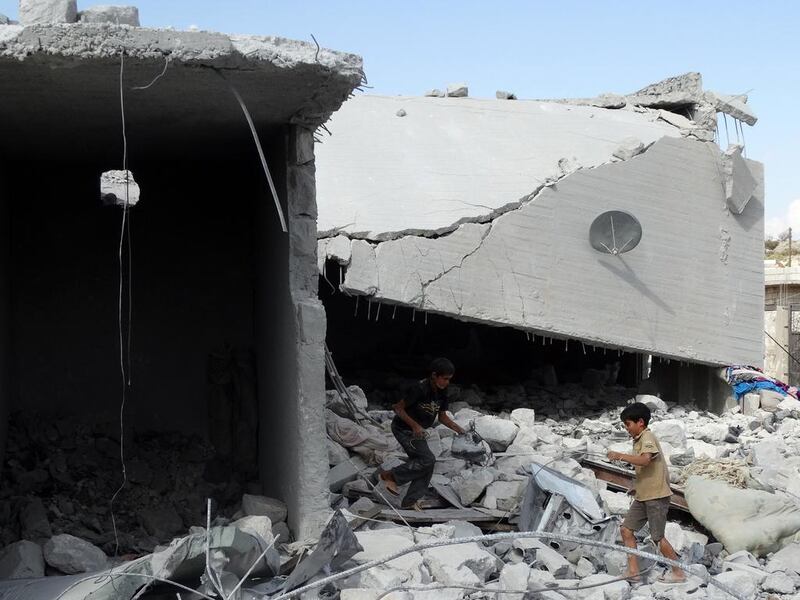After numerous threats and promises of impending action, the US yesterday sent aircraft and cruise missiles to attack ISIL in Syria’s eastern deserts.
The UAE, Saudi Arabia, Bahrain, Jordan and Qatar all played a role in the US-led mission, starting an overt campaign against ISIL that US president Barack Obama has warned will take many years to complete.
Direct involvement of the US military in Syria’s four-year-old uprising-turned-war may appear to mark a significant escalation, and a decisive move to destroy a faction so abhorrently extreme that even the Al Qaeda affiliated Jabhat Al Nusra has been fighting against it.
However, it could be argued that if the US had adopted a more forceful approach to the Al Assad regime from the earliest days of the Arab Spring protests, it wouldn’t now be having to lead the coalition against such an extreme terrorist organisation.
Mr Obama has walked a curious, indecisive middle ground since the Syrian uprising began in March 2011, giving out mixed signals that, while hardly responsible for the war, have played a major role in shaping its current contours.
In the early days of the uprising, the US commander-in-chief called on president Bashar Al Assad to step down, he condemned the regime’s brutality against unarmed civilians – which is, after all, how this all began – and, via envoys, encouraged protesters to keep up their peaceful campaign for political change.
That all convinced many in the Syrian opposition, at the time dominated by moderates, natural allies of western democracies, that the US was on their side, and that Washington would back up its words of support with actions, as it had in Libya when faced with a much lower atrocity threshold.
But that overt support never happened, even when regime tanks were sent to rout peaceful protesters in Homs and Deir Ezzor in the summer of 2011, even when Hizbollah, Iran and Russia piled into the burgeoning conflict throughout 2012 and 2013, even when, in August last year, Mr Al Assad’s forces used chemical weapons to hit rebel-held areas around Damascus to shore up his weakening grip on the country.
What Washington did do was give half-hearted support to rebel factions, participating in a secretive CIA-sponsored arms bridge and in training rebels in Jordan.
The munitions it helped put in rebel hands were never of the type or volume needed to act as equalisers in a grossly one-sided war against Mr Al Assad’s Russian-supplied conventional and militia forces.
Similarly, the training programme only helped a few hundred rebel fighters at a time, too few to have a real impact on the course of the deepening war but enough to make moderate factions cling to the hope that the US really was on their side.
Even that training and weapons programme seems to have been more directed at curtailing burgeoning extremism on the rebels' side — unsuccessfully, as the subsequent meteoritic rise of ISIL and Al Nusra testify.
As policy platforms go, all of this can only be viewed as a success if the aim was to help push the Middle East into chaos — something that many in a regional public, long suspicious of western machinations and US support of Israel, already believe to be the case.
Yesterday’s airstrikes are very much in the same vein; an effort by the White House to appear bold and decisive without actually taking steps that are likely to have a bold and decisive impact on the course of events.
Airstrikes may weaken ISIL on the ground, at least in the short term, by destroying its fighters and equipment. That will help moderate rebels who have been leading the fight against the group, without necessarily helping Mr Al Assad, whose military has pointedly avoided hitting the extremists in those very same areas where the US-led strikes happened yesterday.
In the longer term, however, the action against ISIL will raise wider questions about the role of the US in Syria. War-weary Syrians are already asking why the US used its air power to protect Kurds and Christians in Iraq while refusing to use that same air power to protect Sunni Muslims in Homs, Deraa, Damascus, Idleb and Aleppo when they were being killed by Mr Al Assad and his allies.
Mr Obama used the lack of a United Nations Security Council resolution as a reason not to strike the Assad regime’s forces, but sought no such permission for yesterday’s strikes. It smacks of double standards, and of the White House being outmanoeuvred by its foes.
The rise of ISIL is a result of a brutal war — one deliberately started by Mr Al Assad — in which the extremism of the regime has created an opposing extreme.
Bombing ISIL will, therefore, at best serve as a limited treatment for symptoms of the problem, without resolving any of the underlying causes. And still the principal underlying cause remains the brutal extremism of a regime that will do anything to remain in control. Nobody has yet suggested an answer to that.
psands@thenational.ae





